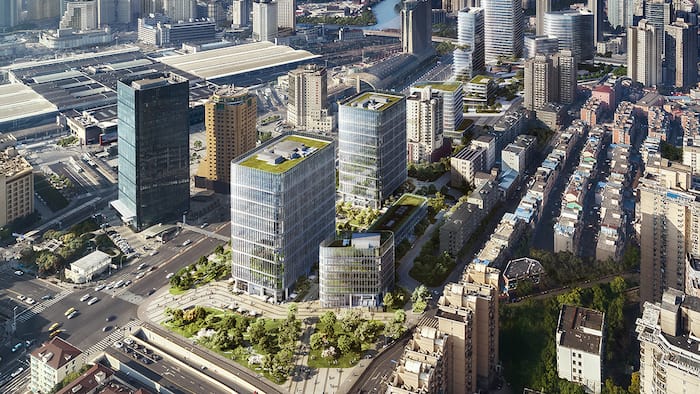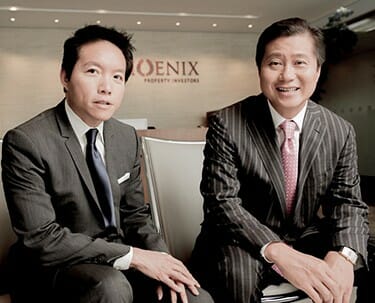
Phoenix has run out of cash near Shanghai Railway Station
A fund managed by Phoenix Property Investors has been forced to restructure the capital structure for a commercial project in Shanghai’s Jing An district, according to an announcement to the Hong Kong stock exchange today as the COVID-19 crisis disrupts the company’s access to financing.
A bourse disclosure today by shipping firm Jinhui Holdings, which is one of Phoenix’ co-investors in the One Financial Street Shanghai project near Shanghai Railway station, has revealed that the Hong Kong-based private equity real estate shop has been working to a replace planned loan financing to complete their purchase of the first phase of the project since it completed last month after earlier plans were disrupted by shifts in Shanghai’s real estate and lending conditions.
Phoenix and its partners had in 2018 agreed to pay $128.6 million to acquire a 100 percent interest in one of two main towers in the first stage of the 490,000 square metre (5.3 million square foot) complex from Shenzhen-listed Financial Street Holdings on a forward funded basis.
Now the Hong Kong firm is said to be working with its co-investors in the project, as well as with external sources of funding, to adjust the project plan before a November loan deadline after the COVID-19 crisis undermined its existing funding plan.
Through a separate joint venture with investors backing the other primary building in the four block phase of the One Financial Street development, the investment manager is said by Jinhui to be facing a parallel November financing deadline, the details of which were not included in Jinhui’s statement. Together, the two towers represent over 63,000 square metres of the nearly 71,000 square metre segment of the overall project.
Should the restructuring efforts fall short, the fund manager and its partners are in danger of being smacked with a penalty equal to 20 percent of the purchase prices for the two towers.
China Capital Markets Get Tough
Jinhui said in its announcement that Phoenix had advised the company, in communications on 19 May and 26 May, that it had failed to land loan financing due to banks reducing their lending activity amid the “tough real estate and capital markets” in China in the wake of the COVID-19 pandemic and the US-China trade war.

Benjamin Lee (L) and Samuel Chu of Phoenix invested in the project through their Fund VI
The private equity shop told Jinhui that a fresh equity injection would be needed to close the funding gap for the purchase of the project, which is composed of four buildings that range in height from 4 to 18 storeys, according to the announcement. However, Phoenix was said to have explained that while this outcome was possible, it was not likely to be economically feasible based on the low rate of projected return.
According to sources familiar with the discussions, a scenario where one or both of the complex’ two main towers are sold to third parties is the most likely scenario to emerge from the restructuring, with the investors confident that a solution can be reached soon. Should such a disposal not take place, the partners are said to have in place back-up plans to refinance the project before a current bridge loan comes to term in November.
Phoenix representatives had not responded to inquiries from Mingtiandi regarding Jinhui’s statement by time of publication.
Searching for an Early Exit
The private equity firm has explained to its investors, according to the announcement, that it has negotiated verbally with Financial Street to extend the payment date for the acquisition, but has not yet reached a new agreement.
In the absence of a reworked deal, and should a buyer or alternative financing not become available, Phoenix, which backed the project through its $1.15 billion Phoenix Asia Real Estate Investment Fund VI fund has advised that the special purpose vehicle for the project would likely default on bridge loans for both towers when they mature in November.
Under a default scenario, investors will be obliged to pay a maximum compensation of 20 percent of the purchase price of the project, resulting in a 74 percent loss on their invested equity.
The Phoenix investment vehicle holds 55 percent of the joint venture that owns the project, while the other investors including Jinhui make up the remainder. Phoenix had signed a strategic cooperation agreement with Financial Street in March 2019 to work together with the Beijing-based developer in completing the multi-phase project, after the local firm had acquired the site in 2015.
Investors to Respond by 3 June
According to the bourse filing, the Hong Kong private equity shop has explained to Jinhui that the Shanghai commercial real estate sector has entered a bear market, with the supply demand dynamic having shifted unfavourably this year, triggering a slide in capital and rental values.
Phoenix, which acted as investment manager on the project, is said to have advised its partners that the impact of the US-China trade war, followed by the COVID-19 lockdown in Shanghai earlier this year, has brought down both capital values and leasing demand in the city.
The Hong Kong private equity firm was reported to be seeking the consent of its investment partners regarding the potential sale of the towers, with responses due by 3 June 2020.
Phoenix closed its Fund VI at $1.15 billion last September, surpassing its hard cap by $250 million. The opportunistic investment vehicle invests mainly in Hong Kong, China, Japan and Taiwan across sectors including residential, office and retail.
Leave a Reply